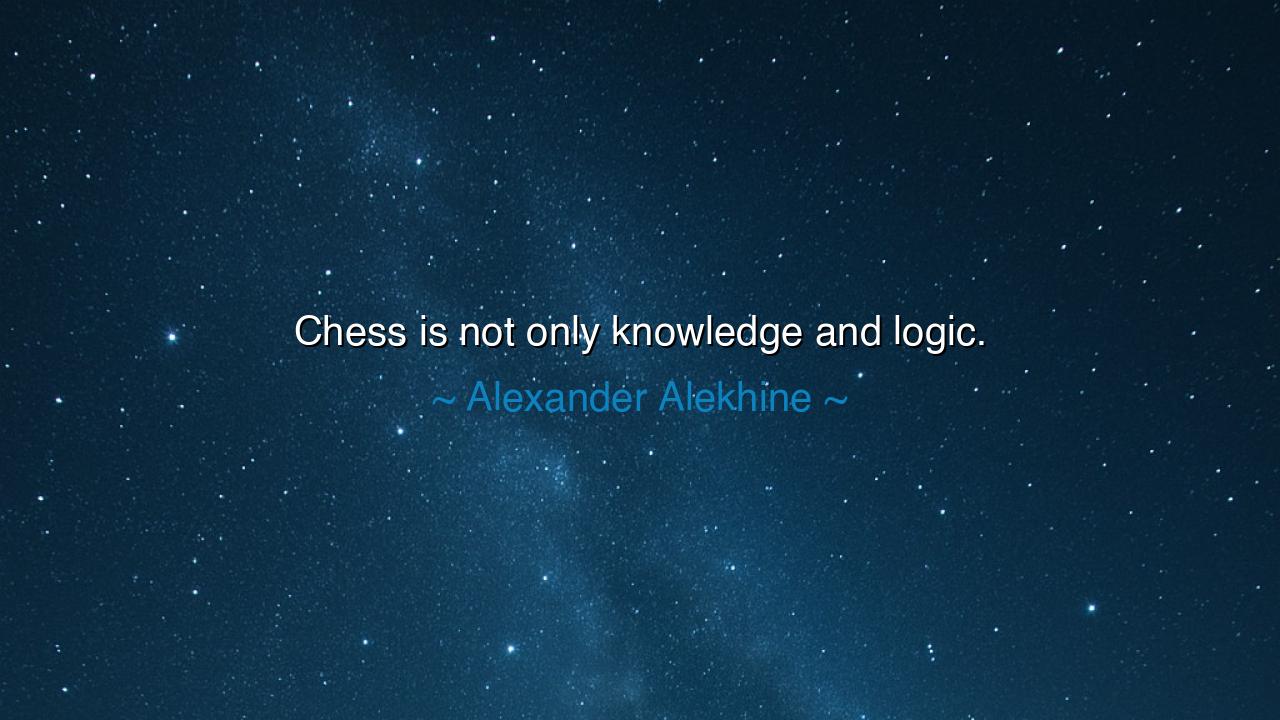
Chess is not only knowledge and logic.






Hear, O seekers of wisdom, the words of Alexander Alekhine, world champion of the royal game, who declared: “Chess is not only knowledge and logic.” This is no idle remark, but the distillation of a lifetime spent upon the checkered battlefield of sixty-four squares. For Alekhine knew that while chess demands study, reason, and calculation, its deepest truth lies beyond mere intellect—it calls for imagination, courage, intuition, and the fire of the human spirit.
The origin of this utterance rests in Alekhine’s own life. He was not merely a student of opening theory or endgame precision, but an artist at the board. His games are remembered not just for correctness, but for beauty—sacrifices that seemed wild, attacks that seemed reckless, but which, in the end, revealed a hidden harmony. To him, knowledge and logic were the foundation, but not the summit. The true summit of chess was reached when a player poured heart, creativity, and daring into the struggle, making the board a canvas of living art.
Consider his immortal game against Richard Réti in 1925. Logic alone would have counseled caution, yet Alekhine launched a brilliant attack, sacrificing pieces with fearless audacity. Onlookers gasped, certain he had overreached. But as the smoke cleared, the brilliance of his conception shone forth, and victory was his. This was the embodiment of his words: chess is not cold calculation only—it is vision, it is will, it is the fusion of mind and soul.
So it is in life. Many believe that to succeed one needs only knowledge—facts, data, rules—or logic—the ability to calculate and reason. Yet history shows otherwise. The explorers who sailed into unknown seas, the inventors who dreamed of flying machines, the reformers who dared to challenge injustice—they were not guided by logic alone, but by faith, courage, and imagination. Just as Alekhine’s artistry transcended the rigid lines of theory, so too must human greatness transcend the narrow confines of intellect.
Think of the Wright brothers, bicycle makers from Ohio, who dared to build a machine that could fly. The logic of their time said flight was impossible; the knowledge of experts dismissed their dream. Yet they pressed forward, guided by vision and perseverance. And like Alekhine at the chessboard, they proved that true achievement demands more than calculation—it demands the spirit to dream, to risk, to act.
Thus, Alekhine’s words are a lesson for all: whether in chess or in life, do not confine yourself to knowledge and logic alone. Use them, yes, as tools, but do not let them chain you. Cultivate imagination, intuition, and the courage to act when the path is uncertain. For greatness is not born of safety, but of boldness, not of rigidity, but of creativity.
Practical action lies before you. In your studies, learn the rules, but also learn when to bend them. In your work, reason carefully, but do not be afraid to innovate. In your struggles, calculate your steps, but also trust your heart. And in your play—whether upon the chessboard or in the larger game of life—let your moves carry not only correctness, but beauty.
So remember, O wayfarers of wisdom: chess is not only knowledge and logic, and neither is life. Both are arenas where the mind must be joined with the soul, where reason must be joined with courage, where calculation must be joined with imagination. Walk this path, and your life, like Alekhine’s games, shall be remembered not only for precision, but for brilliance.






AAdministratorAdministrator
Welcome, honored guests. Please leave a comment, we will respond soon